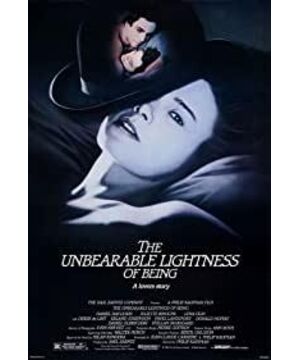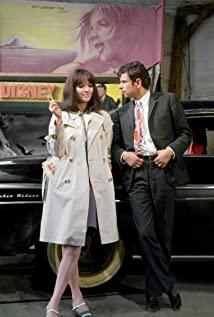Milan Kundera's "Unbearable Lightness of Life", as a literary work, has not lost its popularity for decades. It is a must-have for literary and artistic youth, and it may be closely related to the discussion of spirit and flesh. Although there are no pornographic descriptions, it is The impression is already quite open. The filmed "Love in Prague" cannot be said to fully express the thinking in the novel, but it is more impactful through visualization in terms of spirit and flesh, love and sex, and the emphasis on political background also changes the theme of the film. For love and politics.
The biggest adaptation of the film is that the philosophical discussion is greatly reduced, and the four protagonists are deleted to three, and Franz's branch line is only kept in love with Sabina. From the very beginning, it began to appear throughout, and the farmer and piglet, who appeared last in the original work, appeared earlier.
In general, this can basically be regarded as a love movie, and the main obstacle to the love between Thomas and Theresa lies in Thomas' derailment, and the later context focuses on the influence of politics on fate. If the issue of derailment rises to the level of human nature, spirit and flesh, it can still gain people's approval while attracting people's thinking. Here, the film introduces the concept of "lightness" in the novel, which may mean freedom, unrestrained, indulgence, carnival, etc. Thomas' pursuit of sex is combined with this concept, and the driving force may be the pursuit of pleasure and the search for female diversity . The lightness of the political point of view is also the opposite of responsibility. Leaving the motherland is light, but returning to the motherland is heavy, while giving up a heavy political identity and earning a career is light, and escaping from heavy burdens and fears and returning to the countryside is also light. Unbearable lightness, in a sense, is the pain caused by lightness, and the negative consequences of free choice must also be endured. For example, the suspicion and jealousy of a lover can only be comforted by lies, such as the emptiness brought about by giving up a career. And another overarching concept, "kitsch", comes from the category of aesthetics, which Milan Kundera understands as "aesthetics underpinned by a certain view of the world, which is almost a philosophy", "the essence of human existence Everything that is unacceptable is excluded from its field of vision.” Expanding into the political sphere, every political propaganda relies on kitsch, and totalitarian regimes are the best of its kind. Personal kitsch is to beautify things and please others. The root is "absolute identification with life", which can also be called absolute identification with existence itself. The enemy of kitsch is doubt, because kitsch gives a double-choice answer, choose one of the two Whichever one you choose is kitsch. Kitsch in my personal understanding is to live in the eyes of others, as big as everyone's eyes, then to the eyes of colleagues, as small as the eyes of lovers, and the eyes of imaginary people. To some extent, it is inevitable. human nature. Therefore, if there is only one choice between light and heavy, it is still kitsch. Light does not mean not kitsch. The broad space between light and heavy, you can choose and doubt, is where the value lies.
In the film, the "monster of the kitsch kingdom" has become a more central theme than light and heavy, and it also indicates the choice of the male protagonist. Whether it is physically or politically, the definitions of non-kitsch and lightness are infinitely close. Sabina is both a The antagonist of kitsch is also the representative of lightness. Both Thomas and Teresa chose to oppose the totalitarian system and thus also acted as antagonists of kitsch. However, the shelving of philosophy and the filling of lust and politics in the whole film make this film kitsch in a sense. Sabina becomes the embodiment of lust, which undoubtedly reduces the complexity of spirit and flesh and reduces the special Leisa's subjectivity, her fear and shame of nudity due to her mother's relationship, and her monotony of the body, in Thomas' eyes, she is just one of the common fears. Neither Sabina nor Teresa seems to be able to refer to the spirit. Thomas loves Teresa, it is a love that "must be so", and he is willing to change her life for her. Maybe if you have love, you will love the soul, but There are not many direct expressions of the souls of the two. The war brought the two closer, and the political situation later made the two support each other. Sabina and Thomas have similar personalities. For light pursuits, Sabina is more thorough and does not want to be entangled too much. Although she longs for a relaxed relationship with Thomas, when Thomas cannot go to the United States She still went to the United States alone. She truly betrayed her lover and left the motherland. The end of the light she has to face is that she has nothing to betray and has nothing. It can only be said that only great courage and strength can bear it, life is light The price is unbearable for ordinary people.
The first act of the film provides a quick introduction to the background with text subtitles alternating with images. It started with Thomas, a doctor in Prague in 1968, the protagonist. The character is young and handsome. He said to the beautiful nurse "Take off your clothes" in an orderly tone, and smiled back. The nurse's words showed that the two were naked last night. , Thomas added to check the body, the nurse immediately undressed and faced Thomas, making the patients and doctors in the compartment behind the frosted glass envious. "Take off your clothes" is a typical action of Thomas. It includes Thomas' habit of being in a dominant position in front of women. Part of it is the authority brought by his status as a doctor. The characteristics that people like, the handsomeness of the male protagonist has played a considerable role here, and the age has also changed from middle age to youth. The next subtitle is that the person who knows him best is Sabina, the scene is Sabina wearing a hat and Thomas lying naked on her bed, not sleeping with women The dialogue reveals that Thomas doesn't want to be invaded and bound by women in his life, too A small suspense at the beginning to see if it will be broken, and Sabina admires him because he "stands completely on the opposite side of kitsch, a monster in the kingdom of kitsch", the theme of the roll call, the two make love in front of the mirror, both narcissistic Expression is also the expression of seeking stimulation and sensual pleasure without caring about the eyes of others. At the same time, it reveals the concept and character of the two people, which also enhances the integrity of Sabina's pair of lines. In the next scene, Thomas goes to see a doctor in a spa town and meets Teresa. Surgery, hot spring pools, and symphony bands appeared alternately. Teresa's diving disturbed Thomas, who was watching chess, and Thomas was attracted by her swimming style. She followed her through the sanatorium. Teresa's youth was formed by the aging of the sanatorium. To compare, to the tavern where Teresa was working, Thomas sat down and took out a book while sneaking a glance at Teresa, Teresa turned on the background music of Beethoven, and then turned to Teresa's subjective shot, comparing the surrounding The old chess player, Thomas, who was reading a book, was very conspicuous. The two looked at each other. Teresa brought the wine over, Thomas sent an invitation, and Teresa's answer was warm, shy and simple, with some escapism and confusion. , Teresa hurried home after get off work, changed her clothes, and brought "Anna Karenina". After a brief conversation, Thomas got in the car and was about to go back. Teresa expressed the boredom here and the distress of no one reading the conversation. , Thomas left without an affirmative answer, and Teresa's subjective lens showed her yearning to follow. Subtitles begin and end. The next scene starts with an over-the-shoulder shot of Thomas looking out the window, showing his thoughts about Teresa, in Sabina's studio, about Sabina's hat, which may mean the two The fetters between them reveal the reason why Thomas is chasing women. The mirror turns the picture upside down. Sabina, who is only wearing underwear, becomes the embodiment of lust, and in the end, her thoughts are replaced by lust. The opening climax is Teresa's arrival, undressing and examining her body, not unlike any other woman, to the almost comic kissing and intimacy. At the end, Thomas woke up the next day and found that he was holding Teresa's hand, breaking his habit of not staying with women for the night, and he shook it again, showing his special affection for Teresa, which will change him. life.
Thomas's holding of Teresa's hand is a pivotal event in the love affair, and the novel describes Teresa as "a child in a tree-wax-coated straw basket", and Thomas thinks "if Polybus hadn't adopted Little Oedipus, Sophocles could not have written his most beautiful tragedies," and found "imagining that he had been with her for a long time, and now she was dying. It was suddenly clear to him that I can't die after her, I have to lie beside her and die with her", hesitating in the choice of life only once, unable to determine which choice is better. The metaphor of the adoption of Oedipus was an important factor in Thomas' later metaphor for political speech. The later reflection on encounter is a reflection on contingency and inevitability. Under the appearance of love, the author entrusts various philosophical questions, and these philosophical questions are also part of Thomas' character. The questioner and doubter, when these thoughts are deleted, this part of the character also disappears.
Teresa's appearance actually looks kitsch, part of her self-motivation, and also a desire to impress Thomas with the impression of a girl with a spiritual pursuit. The second appearance seems to have changed this impression, she chose light from her original family and growing up environment. In the film, Teresa represents the heavy, conservative, affection for Thomas, and attitude towards sex, taking the responsibility of documenting the Prague Spring and returning to the motherland. Teresa's photography work actually runs through the spirit and the flesh. The mutual photographing between her and Sabina should imply the meaning of changing her view of body shame. Appreciating beauty, Teresa really realizes in the novel and film. The unity and irreplaceability of her soul and flesh is the climax and key plot point in the movie when she cheats with the engineer.
In addition to the first half of the second act, Thomas talks about the impact of the arrival of Theresa on his promiscuous life, Teresa's new job and the nightmare of Thomas' derailment, which begins to pave the way for the political line Oedipus' eyes, the two get married, Prague The impact of the outbreak of spring on the relationship of several people, Teresa's enthusiasm for participation, Sabina's new romance, Sabina and Teresa's mutual photo shoot, Sabina's departure. A favorite scene is Teresa swimming. When she sank and floated in the water, the woman in front of her who was wearing a swimsuit and preparing for exercise on the shore turned into naked women. Thomas walked in the middle and waved to himself. This expresses her fear of being one of Thomas' many women, but removes the part of the novel that is condemned to death and abandoned. The climax of the first half is also commendable in terms of camera scenes. One is the black-and-white photography taken over by the Soviet Union after the Prague Spring. The shock of tanks entering the city, the siege of people at gunpoints, and the siege of people are almost comparable to documentaries. Sabina's departure is a relief. Partially begins the debility of the confrontation, the death of the protesters, Teresa's record and Thomas's protection, and then the picture becomes a color documentary, the church, the blindfolded statue, the solemn music of the band in the square, and then the people in the parade. , and then back to the black-and-white photography of the tanks crushing the parade car and the crowd scattered, back to the color footage of Teresa taking these moments, and then to the black-and-white tank being burned and exploding, Teresa handing over the photos to foreign reporters At the end of the shot, Thomas is looking for Teresa in the crowd, and Teresa is holding the camera and facing the soldier with the pistol pointed at her. The switching of the camera shows the cruelty of the war and the record of the news. The part of Teresa and Sabina taking pictures of each other, the perspective language is very full, the beauty show starts from Sabina's undressing behind the veil, Sabina goes from being uncomfortable to being watched, to calm, and then to aware of Teresa She was not confident and smiled, Teresa was crying behind the camera, Sabina put on her clothes after Teresa's shooting, Sabina ordered Teresa to take off her clothes, Teresa hid behind the sofa to take off her clothes, There are still panties left, Sabina's sly smile, the shooting turned into a chase, Teresa fell on the sofa, Sabina's touch, a handshake representing trust, the back of Teresa's calm seated image, and then to The two laughed, the relationship between the two changed from tense to relaxed, the position changed and the body was re-understood and so on. Sabina's departure should mark the end of the first half.
In the second half of the political theme, the two returned to China, showing the mutual surveillance between people, the withdrawal of the prepared answer, Thomas's abandonment of his career to become a cleaner and continued derailment, bringing Teresa's pain and trying light. , as well as the possibility and fear of being set up to threaten, and finally the two returned to the countryside and died in a car accident. I feel that there are no particularly good scenes in the second half. The inner shock brought by Thomas' career choice, the career is his must, it is fate, the value lies, the shock of giving up this part cannot be shot, and it will be lost. the weight ratio of this paragraph. The climax of the second half is placed in Teresa's search for the possibility of non-love sex, for lightness. The movie shows Teresa's final rejection and loyalty. In the novel, Teresa's entanglement also implies yearning. She realizes the uniqueness of her body. Spirit and flesh, love and sex are torn each other, and she also breaks the mother's belt. The curse to come. Whether it's a novel or a movie, there's a feeling of unfairness in this relationship." Tereza knew what happened in the moment when love was born: a woman is powerless to resist any voice that calls out to her frightened soul, and a man is powerless to hold back any soul. The woman who was answering the call. Thomas couldn't resist the temptation of love, and Tereza worried about him every minute of every hour. . . . What weapons did she have at her disposal? No, she only had loyalty. From the very beginning, from day one, she seemed to understand that she had nothing else to give but a piece of fidelity to give. Their love was an asymmetrical misshapen building: underpinning the building was her infallible fidelity, Like a building with only one pillar to support it." The final outcome ends with the two living in isolation until death.
In general, the filming of the film is still weak. Although the story line is complete, the rhythm of the second half is much weaker than the previous tense shots, and the climax is lower than the climax of the first half, although the clues of the first half are also Rather messy. It’s hard to say whether the political drama in the second half plays the role of political propaganda, and this film was shot in 1988 as an American film, and the Soviet Union will disintegrate in 1991. Although criticizing the totalitarian system is the original meaning of the novel, it is still doubtful. Political correctness exceeds the pursuit of art, and the flattery of the erotic part to the public also seems to exceed the pursuit of art. Criticizing kitsch and standing in kitsch may be the paradox of this film.
View more about The Unbearable Lightness of Being reviews











